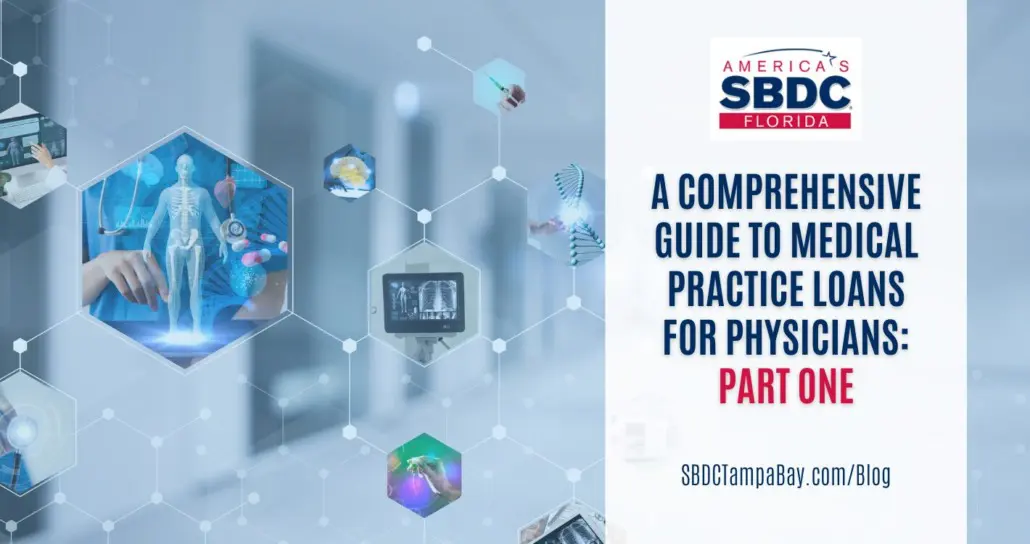A Comprehensive Guide to Medical Practice Loans for Physicians: Part One

by Bradley Mix | January 30, 2024
After years of dedication and hard work in medical school and residency, starting and running your own medical practice may be the next step in your career. However, like any small business owner, you need to obtain the necessary capital to start your medical practice. Medical practice loans offer favorable loan terms to physicians looking to start or expand their medical practice. In this guide, we will explore medical practice loans, their uses, and the various options available to physicians. Additionally, we will highlight some reputable banks offering medical practice loans in the second part of this series.
Medical Practice Business Loans
Medical practice loans are specifically designed to provide doctors and medical specialists with the necessary funds to start or expand their practices. These loans cater to a range of medical professionals, from general practitioners and family physicians to specialists such as dermatologists, pediatricians, plastic surgeons, podiatrists, as well as veterinarians. Most medical practice loans will provide 100% financing, with the exception of real estate which requires a down payment, and a lower interest rate than other commercial loans. These loans can be obtained from traditional banks, as well as online lenders, often providing full financing to establish a new practice.
Uses For Medical Practice Loans
Medical practice loans can be utilized for a variety of purposes. Here are some common loan uses:
- Starting a private practice: Starting a medical practice from scratch entails various expenses, such as hiring and training staff, outfitting offices with essential equipment and supplies, conducting marketing and advertising initiatives, making tenant improvements for office space, and securing working capital. It’s crucial to be aware that if the majority of your patients have medical insurance, you will require a substantial initial cash reserve to address expenses until you receive patient billings from medical insurance companies. This billing collection process typically takes 30 to 60 days.
- Acquiring an existing medical practice: Rather than starting a practice from scratch, some physicians may have the opportunity to acquire an existing practice from a retiring physician. Medical practice loans can help finance the purchase of an established medical practice, facilitating a smoother transition.
- Commercial real estate: Purchasing a building is popular among medical professionals as an investment to complement their medical practice. These loans can cover the costs associated with building acquisition, renovations, or new ground-up construction.
- Equipment: Medical practices often require a significant expenditure to purchase state of the art equipment. Medical practice loans allow physicians to purchase or upgrade equipment as needed, whether it’s basic items like exam tables and computer software or specialized equipment such as dental x-ray machines or optometry retinal scanners.
- Business line of credit: A business line of credit provides a revolving credit line that can be drawn upon as needed, similar to a business credit card. A line of credit provides the practice with funds to effectively manage cash flow.
- Small Business Administration (SBA) Loans: Although SBA loans are not considered a medical practice loan, they offer a viable financing option to medical professionals. These loans are made by commercial banks with a loan guarantee provided by the U.S. Small Business Administration (SBA). Banks will sometimes offer these loans to less experienced medical professionals or borrowers with weaker credit.
How To Apply for Medical Practice Financing
When applying for medical practice financing, it’s crucial to be well-prepared. Follow these steps to increase your chances of a successful application:
- Check your credit score: Most banks making commercial loans use Experian Credit Reporting agency and require a FICO score of 680 or higher.
- Have your business plan and financial projections ready: If you are starting a new practice or acquiring an existing practice, the lender will require a written business plan and financial projections.
- Provide financial documents: For an existing practice, you will need to provide the lender with copies of both your business and personal tax returns, Profit & Loss Statements, Balance Sheet, and Aging of Accounts Receivable.
- Collateral: The bank will place a blanket UCC filing on business assets. The business assets including medical equipment will serve as collateral. Lenders will also require a personal guarantee, as with other small business loans, because medical practice loans are often based on the physician’s experience and personal financial strength.
When ready to start or expand your medical practice, make sure to do your due diligence and find the right medical practice financing for your business. Read part two of this series to find several banks that offer medical practice loans.
Author
A Comprehensive Guide to Medical Practice Loans for Physicians: Part Two





Brad Mix
Consultants, Growth Acceleration Consultants, Manatee, Mix, SarasotaSpecialty: Capital Access, Startup Brad Mix has more than 20 years of experience in the financial services industry and as a business consultant. Prior to joining the Florida SBDC at USF, Mix provided consulting services to more than 2,500 businesses and assisted business owners in securing more than $100 million in capital and $60 million in government contracts. He has extensive experience with SBA loans, including 504s, Community Advantage loans, and microloans. In addition, he assists business owners in preparing business plans, financial projections, profitability improvement, business acquisitions, business valuations, marketing and capital solutions. He joined the Florida SBDC at USF in April 2020, after spending 20 years as a consultant and satellite manager for the Coachella Valley SBDC, located in Palm Springs, Ca. In 2005, he was awarded the California State Star Award by the California SBDC Network. He is a certified Associate Business Continuity Professional (ABCP).